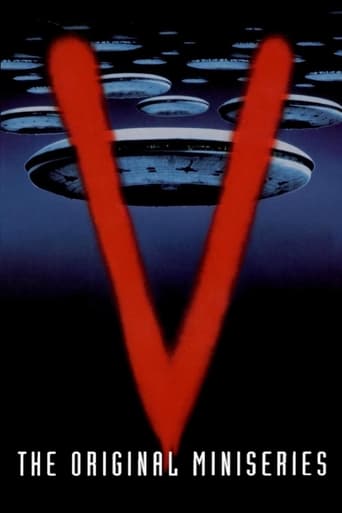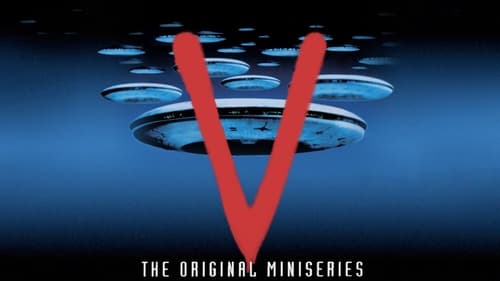Matthew Kresal
If a ninety-nine out of a hundred science fiction films fall into being cliché ridden, one will stand out above the rest. V, in its original miniseries, would be one of those that stands above the rest. V is anything but your typical science fiction story of an alien invasion. It is a tale of a fascist (alien) takeover of our society and the resistance of a few in a society to it. As a result V, while a product of the technology and culture of the 1980's, is a timeless piece of science fiction.One of the elements to V's success is its cast. Leading, so to speak, the cast of human characters are Marc Singer as cameraman Mike Donovan and Faye Grant as med-student turned rebel leader Julie Parrish. Both Singer and Grant give nice performances that, for the most part, come across as real people in extraordinary situations. In fact the performances of the entire cast be described by that last phrase as well ranging from the Maxwell family (Michael Durrell, Penelope Windust as the parents with Blair Tefkin, Viveka Davis and Marin May as their daughters) who find themselves persecuted to the point of joining the resistance much like the Taylor family (Jason Bernard, Richard Lawson and Michael Wright) to the Bernstein family (George Morfogen, Bonnie Bartlett) who find themselves torn between their Visitor friendly son Daniel (David Packer) and the Holocaust survivor grandfather Abraham (Leonardo Cimino). In fact the single best scene involves Abraham, who is wanting to hide the persecuted Maxwell's, reminding his son that this whole situation is all too familiar for the consequences of them not being hidden means "we haven't learned a thing". This is a scene that is not only well acted and well written but incredibly rare in your average science fiction story as well. There's also many other fine members of the cast including Neva Patterson (Donovan's mom), Evan Kim (Donovan's camera partner Tony), Jenny Sullivan (reporter turned Visitor spokeswoman Kristine Walsh) and Kristine Walsh (as Gardener turned rebel Sancho) amongst many others. The human side of the cast is just the tip of the iceberg though.There's also a fine cast playing the alien "visitors" as well. They range from their seemingly benevolent leader John (played briefly and well by Richard Herd) to Andrew Prine as the authoritative Steven. Then there's the innocent abroad in the form of Robert Englund as Willie and the resistance from within the visitors themselves in the form of Frank Ashmore as Martin and Jenny Neumann as Barbara. Then there is Jane Badler as Diana, perhaps the most attractive and conniving of the alien visitors, who plays the role with a seriousness not usually found in this kind of role. Together they form one of the best, and definitely one of the most diverse, cast of alien invaders ever assembled.V is also aided by fine work behind the camera. There's the cinematography of John McPherson especially the tracking shot of characters watching the first contact sequence and the scenes in the mother-ship. The production design in the form of the mother ship interiors are fine examples of science fiction sets. There's also the special effects work ranging from the excellent shots of mother-ships (a decade plus before Independence Day) to the aerial dogfight at the end which all work marvelously for the most part despite a very few shots which don't look quite finished. No review of V is complete without mentioned the fine prosthetic work of the miniseries which range from the Visitors true faces to some rather uncomfortable dining sequences. Last, but not least by any means, is the fine score by composer Joe Harnell which takes puts together classical music influences and choir in one of the most unusual and best scores produced for any science fiction television piece I have heard, especially for the opening and closing credits of any part. In short: strong production values go a long way.To my mind V's ultimate success lies in the script and direction of Kenneth Johnson. V was originally conceived not as a science fiction tale of alien invasion but as the tale of a fascist takeover of the U.S which can still be found deeply embedded in the final product. In fact that is what separates V from many other alien invasion stories. V is about fascism, how people can be lured in by it, how far those in power will go to secure their position, how the average person will react and what happens when ordinary people stand up to resist it. There's also more then a few hints of Nazi Germany as well from the Swastika-like symbol of the Visitors to Friends of the Visitors youth groups (the Hitler Youth) and, before the miniseries is over with, a strong allegory with the Holocaust as well (see the miniseries to get it). Wisely Johnson also puts a fair (but not gratitude) amount of action in as well which helps to compliment the story and move it along. V is embedded in the technology and culture of the 1980's when it was made to sure but that doesn't date the story at all. Instead V becomes, like H.G. Welles War of the Worlds before it, a timeless tale of alien invasion and human resistance to it.What makes V successful? Well it's large cast of fine actors, nice cinematography, good special effects work, excellent prosthetic work and fine score go along way. Yet the true success of V lies in its script and story. Why? Because ultimately V is not about spaceships and ray-guns but is about people and their reactions to the extraordinary events around them.
garrieaaron
V: the Original 2-part miniseries is over 20 years old now. But anyone who saw it on TV in the early 80's (as I did) will never forget how entertaining it was. And upon recent re-viewing the series still holds up as a powerful and engaging piece of TV drama.Is the story contrived? Somewhat. Are the special effects dated? Yes, this was a made for TV movie/miniseries created in the early 80's, but comparative to that time frame the effects were rather impressive. Some of the acting is either over-the-top or rather mediocre. These flaws can be forgiven considering the overall intriguing concepts presented to the viewer. Several of the main characters including some of the malevolent alien "Visitors" are indeed quite enduring.Nonetheless V is surprisingly relevant to our current state of national affairs. I would recommend this movie not only to sci-fi admirers, but also to anyone who enjoys a good drama.
scotfilmnut
I think because of the introduction of Blue/green screen technology and computer graphics - V can come across as abit dated but it is still very entertaining and full of fabulous colourful, yet realistic characters. Ham Tyler, played with gusto by Michael Ironside, is one that sticks out and stays in my mind and also jane Balder - a sexy bad woman alien known as Diana...love it! The weapons and spacecraft are also top draw sci-fi creations and Donavan (Marc singer) is so brilliantly dramatic in his physical stances - also love it...but the bad guys/aliens are still quite menacing in the way we know that want to actually eat all of us.I hope they re-make this as a ten part mini series!!
Global_Marketing_Pros
I think V is a popularized version of the series "The Outer Limits". Although V does address the reasoning for development of the human species. But "The Outer Limits" examines how the human species defies extra-ordinary phenomena due to human-species exceptional analytical abilities to manipulate electrical fields. This analytical ability keeps people from entering into the world of television by being able to hypothesize, yet remain fearfully skeptical.Anti-gravity is supposedly how the V mother ship stays off the planet Earth and how the V species travels on terrestrial Earth. So the concept of electrical field theory, the manipulation of electrical fields, and manipulation of biological systems seems as how V intends to beat the human species.Another aspect of V is the food source technology. They seem to toy with the concepts of reptiles being superior and humans being a food source as well as other animals such as birds. Thus the question of the food chain and hierarchy of food sources by dominate species becomes materialized. Again the question being who is the dominate species being at the top of the food chain and who controls technology effectively being the winner of the human species.These questions of evolution seem to be played with in a series because everyone wonders what will happen next in the next episode. Just like in V where curiosity leads humans into the mother-ship to learn the secrets of V. Curiosity being used as a psychological tool by the V species to lead them into the ship.Or like having the genetic blue print of the human species but not fully making a human useful. Curiosity can be a learning activity of random chance that may produce a time dependent variable according to generations needed to establish a certain point of acceptance with not the gene pool of the human species but how much a life time is actually needed to achieve in terms of work. Supposing the space ship needed to travel for 200 years in space to reach the next Earth like terrestial planet then you would need to live for 200 years or the knowledge used would need to be comprehended and made operable by a knowledgeable human at any point in time that work was needed to be done.This seems to mirror the plot of the movie 2010 a Space Odessy where the mono-lithe speaks to Dave and Hal the ship computer. Dave finally says as his last words, "Its full of stars". What really happens to Dave no one knows. Dave just obeys their commands and disappears. In the movie V at least they the human species know they are trying to investigate the ship because they are afraid of dying or being used a food source.I think V is a fairly good show of use of creativity and concept development using science and scientific methods. The use of curiosity to develop the plot is also very good. However, that mirror plot of 2010 a Space Odessy is also an alternative reality within this plot. Would a superior species with command of technology such as the V species really allow a human to win?




